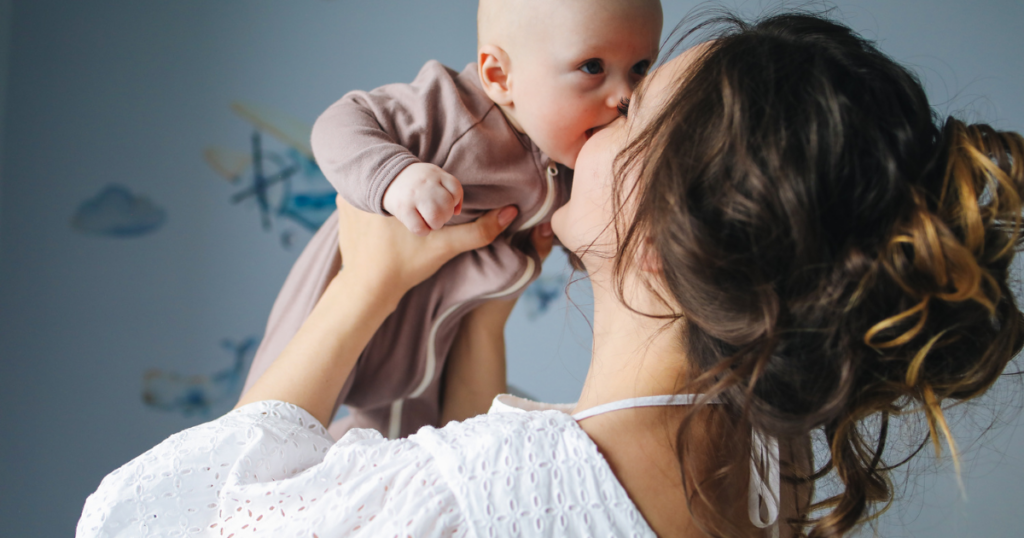Follow
Wellness & Co.
Hi, I'm Dr. K, Wellness & Co. is a growing therapy/coaching practice and educational hub for prospective clients based in Maryland and virtual clients all over the world!
Hi, I'm Dr. K
free guide
e -books
e -course
5 Things New Moms Can Do to Care for Themselves
May 12, 2025
By Erin Newton, LCPC, PMH-C
Reading Time: 5 minutes
Hello and Happy Mother’s Day to all the moms out there! This post is especially for our new moms, those sleep deprived, unshowered, still in the same sour milk soaked shirt for the last two days goddesses just struggling for a tiny nap, a coffee in peace, and a break (Just one. Please? A tiny break?). I myself had three babies in 5.5 years, which for me meant that I nursed for 4.25 years straight and seven years total, and I didn’t sleep for what felt like a decade.

When we have a new baby, everything that we thought we knew about the kind of mother we were going to be often goes right out the window. Sleep deprivation can hit us HARD. If we’re not careful, we can end up cranky, mean, and unrecognizable to ourselves. And worse, we can end up sliding further into actual postpartum depression.
Here are five really important things that new moms should aim to do in the postpartum period to keep their sanity and to stay their best selves.
- SLEEP (yes, I’m serious): Yes, yes, I know, you’re asking yourself, “Erin, is that a joke? Are you trolling me?” I completely understand that what I’m saying here seems insane and unattainable. My oldest two kids didn’t go to sleep on their own and sleep through the night until they were each two years old, and they’re 23 months apart sooo…you do the math. But when it comes to our mental health, sleep is crucial (check out Rebecca’s blog series on sleep!. In fact, we could argue that it is the most important factor in managing and preventing depression symptoms in new moms. Everything seems so much worse when we’re sleep deprived. Our brains need sleep to help us regulate our emotions, consolidate memory, repair our bodies, and boost our immune system. When I work with a new mom who is struggling emotionally, the first thing I ask about is her sleep. Oftentimes just increasing her hours of sleep can really help with depression symptoms. Get creative here – take naps during the day, encourage your partner to help at night (even if you’re nursing – there is a role for dads here too!), hire a nighttime doula if you have the means, or ask a friend or relative to come help during the night or hang out during the day so you can nap. Remember that the newborn stage is temporary – I swear you will sleep again! – but preserving your sleep as much as you can will go a long way in feeling stable.
- Eating food and drinking water: This one seems silly, because of course you’re going to remember to eat…except maybe you’re not. That whole sleep deprivation thing can throw you completely off course, and when we’re so busy taking care of a baby, it’s really easy to forget about ourselves. You would be surprised how often I ask a new mom when she last ate and she can’t remember her last full meal. Try to prepare for this in advance – prepping freezer meals before your baby is born, asking visitors to show up with food, or having take out menus/websites within easy reach are all good ways to remember to eat. And keep a fun water bottle by you at all times – especially if you’re nursing!
- Showering & changing your clothes: I know, I know, you’re thinking “this lady’s got jokes!” but I promise the effort to do this is worth it. Just taking a shower and putting on something else (even if that’s still pajamas!) can do a lot for your mental health. I know your baby probably doesn’t want to be put down, but this is where your support comes in. Give your baby to your partner, your mom, your friend – whoever is available to hold her while you shower. Worst case scenario? Your baby really will be ok fussing for a few minutes. Make sure they’re somewhere safe, turn off the monitor (just briefly!), and don’t dally. It’s worth it for you to feel refreshed when you come back to them again.
- Going for a walk, listening to your favorite music, going for a Target run: Basically anything that gets you moving and helps you remember who you were before you became “mom”. We know that exercise can boost mood and actually help with exhaustion, and fresh air can help you feel like a brand new woman. Also, a huge piece of the puzzle with PPD is adjusting to a new role. The transition from “adult woman who does what she wants” to “mom ruled by a tiny baby” is often abrupt and all consuming in a way no one expects. Getting out and into your “normal” (if somewhat modified) routine can do a lot for your mental state.

- And finally, talking to people about how you’re feeling: And when I say people, that can mean your partner, your mom, your sister, your best friend, and, if necessary, someone like me. The first two weeks after delivery, it’s normal to feel teary, tired, and to have our mood shift frequently and abrupting – we call this the “baby blues” and it’s a combination of postpartum hormones adjusting and a lack of sleep. During this time; however, your self-esteem shouldn’t change, your sense of humor should remain intact, and you shouldn’t feel a sense of deep sadness or have thoughts of hurting yourself. If any of those symptoms are present or if your feelings last beyond two weeks, it’s no longer considered the baby blues, and we are firmly in postpartum depression territory. If that happens, please find a therapist who specializes in perinatal mental health, such as yours truly!
The postpartum period is such a terrible, beautiful, difficult, wonderful time. I never ever tell new moms “You’re gonna miss this” or “You better soak this up” or any of the other very well meaning things we seem to tell new moms when they’re struggling. My kids are now 16, 14, and almost 11 and honestly? I don’t miss it. Do I sometimes miss nursing a baby back to sleep at 2 AM, in the dark and quiet with me and her the only ones awake in the world? Absolutely. Are there days when I want to snuggle my kids again and breathe them in and let time stand still? 100%.
But do I want to do it every night for four years in a row again? No ma’am, I do not.
Take care of yourselves, mamas! You deserve to feel good and to enjoy this time as much as you can. You brought a new life into the world! You are amazing! Don’t forget to treat yourself that way.
Be with you again soon,
Erin
Erin Newton has been working with individuals and families for almost nine years now. She specializes in perinatal mental health, birth trauma, and anxiety related issues. She strives to help her clients feel seen, heard, understood and to give them the tools they need to start their own journey of healing.
Leave a Reply Cancel reply
CONTACT
Start Here
BLOG
OUR TEAM
SHOP
ABOUT
©2025 Wellness & Co. | All Rights Reserved | Design by EverMint Design Studio
BACK TO TOP
connect with us on instagram
